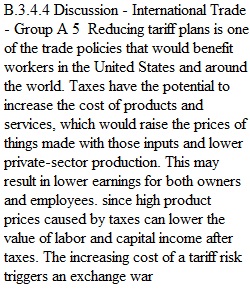


Q B.3.4.4 Discussion - International Trade - Group A 5 From ECON-102-OMH-CRN55774 The Impact of the Trade War Trade is based on Comparative Advantage among countries where pricing and resources best allocate the production of products. Interventions (Tariffs and Quotas) in the free flow of trade produces an imbalance in the market. Trade protection may raise domestic production in one job market, but cause a loss in another as trade partners retaliate in a Tit for Tat International Trade War Watch The Realities of Trump's Trade Wars. Post a response of your view of the information as seen from a macroeconomic point of view. The post is NOT about a battle of political ideology, but of economic principles and observations of the trade policy. (Instead of Free Trade) Stanford's John Taylor on the benefits of Free Trade The North American Free Trade Agreement (NAFTA) was the product of the Pre-Trump Republican Party that gained the support and backing of both Democrats and Republicans. Below is the NAFTA Superhighway that would provide free trade among Canada, The United States, and Mexic. Discussion Question Requirements: Each student is required to post a 200 word response to the question. The student then must post at least a 100 word response to at lease ONE other student post. Post-=4 points. Comment = 2 Points Submit Original Post by the Due Date. Comments are open for four (4) days after the Due Date or until the Available Until Date
View Related Questions